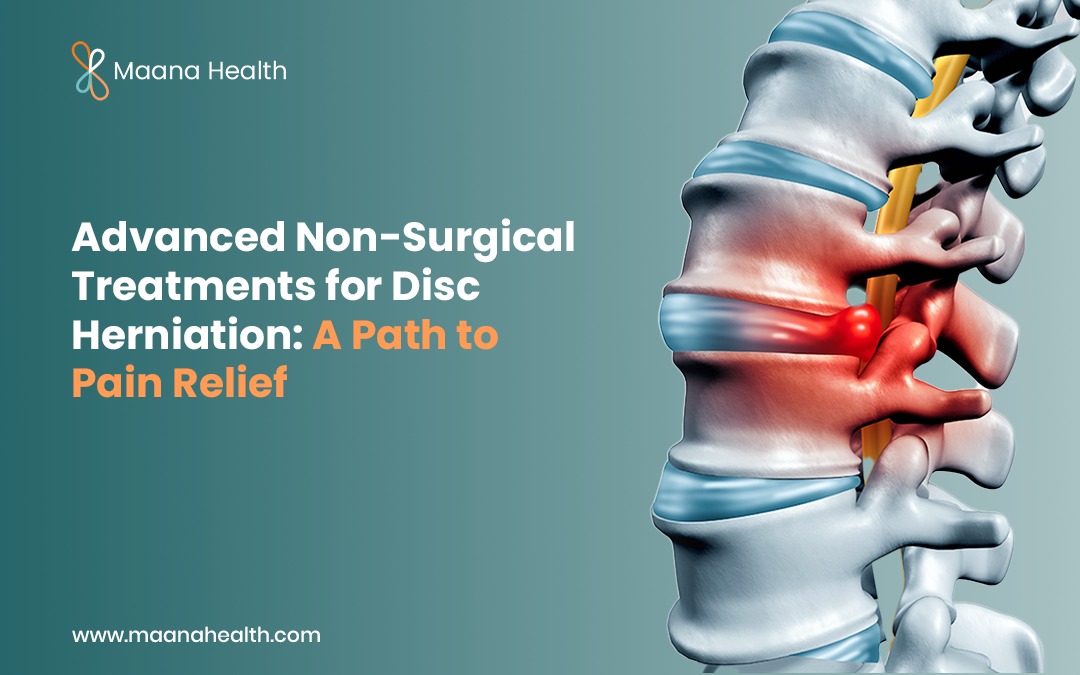Disc herniation, also known as a slipped or ruptured disc, is a common spinal condition that can cause significant pain, numbness, and mobility issues. It occurs when the soft, gel-like center of a spinal disc pushes through a tear in the outer layer, often compressing nearby nerves. Many individuals suffering from disc herniation believe that surgery is their only option for relief. However, at Maana Health, we offer advanced non-surgical treatments that help patients recover and regain mobility without the risks of invasive procedures.
In this blog, we’ll explore what causes disc herniation, its symptoms, and the latest non-surgical treatments available at Maana Health to help you live a pain-free life.
________________________________________
What Causes Disc Herniation?
A herniated disc can develop due to various factors, including:
• Aging & Degeneration – Over time, spinal discs lose their elasticity and hydration, making them more prone to tears.
• Improper Lifting – Lifting heavy objects incorrectly can put excessive strain on the spine.
• Repetitive Movements – Jobs or activities that involve frequent bending, twisting, or lifting increase the risk of disc damage.
• Poor Posture – Prolonged sitting, slouching, or improper spinal alignment can contribute to disc herniation.
• Obesity – Excess weight increases stress on the spine, leading to faster disc wear and tear.
• Genetics – Some individuals are genetically predisposed to disc degeneration and herniation.
________________________________________
Symptoms of a Herniated Disc
The symptoms of disc herniation depend on where the affected disc is located in the spine. Common signs include:
Lower Back Pain – Persistent pain that may radiate to the buttocks, thighs, or legs (sciatica).
Neck Pain – If the herniation is in the cervical spine, pain may spread to the shoulders, arms, or hands.
Numbness or Tingling – A herniated disc can compress nerves, causing tingling sensations in the arms, hands, legs, or feet.
Weakness in Muscles – Compressed nerves can lead to muscle weakness, affecting balance and grip strength.
Pain Worsens with Movement – Activities like bending, sitting, coughing, or sneezing may intensify the pain.
________________________________________
Advanced Non-Surgical Treatments for Disc Herniation at Maana Health
At Maana Health, we specialize in cutting-edge, non-invasive therapies that provide pain relief and promote spinal healing. Our holistic and evidence-based approach focuses on reducing pain, restoring function, and preventing future injuries.
1. Spinal Decompression Therapy
How it works: This non-surgical therapy gently stretches the spine, creating negative pressure within the disc. This relieves nerve compression and encourages the disc to retract.
Benefits:
• Reduces pain and inflammation
• Improves spinal disc hydration and healing
• Enhances mobility and posture
2. Extracorporeal Shock Wave Therapy (ESWT)
How it works: ESWT uses high-energy sound waves to stimulate tissue healing and reduce inflammation in the affected area.
Benefits:
• Relieves chronic back pain
• Reduces inflammation and scar tissue formation
• Enhances natural healing processes
3. Pulsed Signal Therapy (PST)
How it works: PST is a revolutionary treatment that uses electromagnetic fields to stimulate cartilage and disc repair at a cellular level.
Benefits:
• Promotes regeneration of damaged spinal discs
• Enhances mobility and reduces stiffness
• Non-invasive and pain-free treatment
4. Acceptance-Based Physiotherapy
How it works: A unique approach that combines traditional physiotherapy with mind-body techniques to help patients cope with chronic pain more effectively.
Benefits:
• Helps patients adapt to pain management techniques
• Reduces stress-related muscle tension
• Improves overall treatment success by addressing mental resilience
5. Cryotherapy for Inflammation & Pain Relief
How it works: This therapy exposes the affected area to extreme cold temperatures, reducing inflammation and numbing pain.
Benefits:
• Provides quick pain relief
• Reduces swelling and promotes healing
• Non-invasive and highly effective
________________________________________
How to Prevent Disc Herniation & Maintain Spine Health
While non-surgical treatments can provide relief, prevention is key to long-term spinal health. Here are some tips to keep your spine healthy:
✔️ Maintain Proper Posture – Keep your spine aligned when sitting and standing.
✔️ Exercise Regularly – Strengthen core and back muscles with low-impact exercises like yoga, swimming, or walking.
✔️ Lift Objects Safely – Bend at the knees, not at the waist, and avoid twisting motions.
✔️ Stay Hydrated & Eat a Balanced Diet – Proper nutrition keeps spinal discs healthy.
✔️ Maintain a Healthy Weight – Reducing excess weight lowers the strain on spinal discs.
________________________________________
Why Choose Maana Health for Disc Herniation Treatment?
At Maana Health, we are committed to providing personalized, evidence-based care for disc herniation and other spinal conditions. Our advanced non-surgical treatments focus on long-term pain relief and mobility restoration without the need for surgery.

